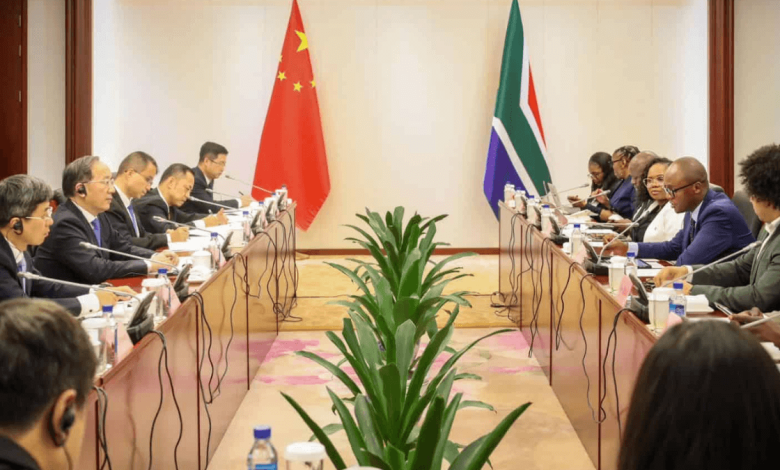SA and China Forge AI Collaboration to Drive Innovation

Strategic AI partnership targets education, agriculture, broadband access, and inclusive digital transformation.
SA and China Unite to Shape the Future of AI
SA and China’s AI Collaboration: SA has entered into a groundbreaking agreement with China to deepen cooperation in artificial intelligence (AI) and digital innovation. The partnership follows a high-level investment-focused visit to China by Minister of Communications and Digital Technologies, Solly Malatsi, who led a delegation to strengthen bilateral digital ties.

The engagements, which spanned Beijing, Shenzhen, and Shanghai, are part of South Africa’s broader digital transformation agenda. They aim to secure collaborative research and application of AI in key public sectors, including education, agriculture, and service delivery—areas where innovation could bridge economic and social divides.
Targeting Transformation in Education, Agriculture, and Public Service
One of the central goals of the AI cooperation is to unlock practical uses of artificial intelligence in education and agriculture, where smart technologies can aid in curriculum enhancement, precision farming, and improved resource management. South Africa’s digital infrastructure challenges, particularly in rural areas, were top of the agenda.
South Africa hopes to leverage China’s advanced AI capabilities to bolster its internal systems and public sector efficiency. The delegation explored multiple initiatives aligned with digital inclusion, including connectivity improvements and technology accessibility for previously disadvantaged communities.
Enhancing Digital Connectivity in Underserved Areas
The delegation also discussed satellite broadband initiatives with the China Satellite Network Company (CSNC), a move aimed at solving South Africa’s “last-mile” internet problem in rural and semi-rural areas. With Elon Musk’s Starlink still unavailable in South Africa due to regulatory delays, the Chinese alternative could present a vital workaround.
The department seeks to build future-ready infrastructure to support learning, healthcare, and e-governance.
Financing the Future with Export-Import Bank of China
Beyond tech partnerships, the South African team also met with the Export-Import Bank of China to advocate for increased development financing. With the country’s broadband rollout facing budgetary constraints, foreign funding could fast-track infrastructure deployment, particularly in impoverished areas.
Minister Malatsi underscored the urgency of building a resilient digital backbone, one that can support cloud services, AI-driven data analytics, and remote learning environments nationwide.
Huawei and Honour: Pushing for Affordable Smart Devices
In pursuit of bridging the affordability gap, the minister engaged with tech giants Huawei and Honor to discuss cheaper smartphones and device accessibility. This supports the ongoing “smart devices for learners and entrepreneurs” initiative, which aims to ensure every young person and small business owner has digital tools to compete in the economy.
These engagements follow Malatsi’s February 2025 campaign to reduce smartphone prices and make smart tech more accessible to low-income earners.
Bridging the Digital Divide
South Africa remains trapped in a digital chasm caused by limited infrastructure, high data costs, and low tech literacy. The partnership with China, with its advanced 5G networks and AI leadership, may finally begin to bridge this gap—especially in marginalised regions of the country.
By ensuring connectivity, devices, and skills development, the strategy presents a holistic approach to inclusive digital growth.
Building Skills for the Digital Economy
One of the most promising areas of cooperation lies in digital skills development. Talks held with the China Branch of the BRICS Institute of Future Networks highlighted the shared commitment to upskilling youth and government officials in AI, data management, and cyber governance.
This aligns with South Africa’s stated goal of developing a future-ready workforce, as outlined in national ICT strategies and global development benchmarks.
Global Dialogue on AI Ethics and Development
While in Shanghai, the South African delegation attended the 2025 World Artificial Intelligence Conference & High-Level Meeting on Global AI Governance. Here, the conversation shifted to ethical AI deployment and the risks of exclusion in global AI systems.
Kwena Moloto, spokesperson for the Department of Communications and Digital Technologies, noted that “AI is transforming the world rapidly, and international collaboration is crucial to ensure that its use is ethical and development-oriented.”
Aligning Policy with Global Tech Trends
This strategic engagement with China represents a pivotal moment in aligning South Africa’s digital policies with global AI trends. The partnership serves both economic and geopolitical interests—strengthening SA’s position within the BRICS alliance and positioning the country as a digital leader on the African continent.
It also demonstrates confidence in South Africa’s digital potential, as acknowledged by multiple Chinese ICT firms that participated in the bilateral sessions.
The Road Ahead: Announcements Coming Soon
Kwena Moloto hinted at “exciting partnerships” secured during the China visit, to be publicly announced in the coming days. These could include MOUs with tech firms, funding mechanisms, and AI pilot projects that touch real lives—from smart farming in Limpopo to e-learning in the Eastern Cape.
If successfully executed, this SA-China digital collaboration could redefine the technological future of South Africa, while setting a powerful precedent for inclusive innovation across the developing world.
Also read: China Exposes U.S. Luxury Goods Markups as Tariffs Spark Consumer Backlash